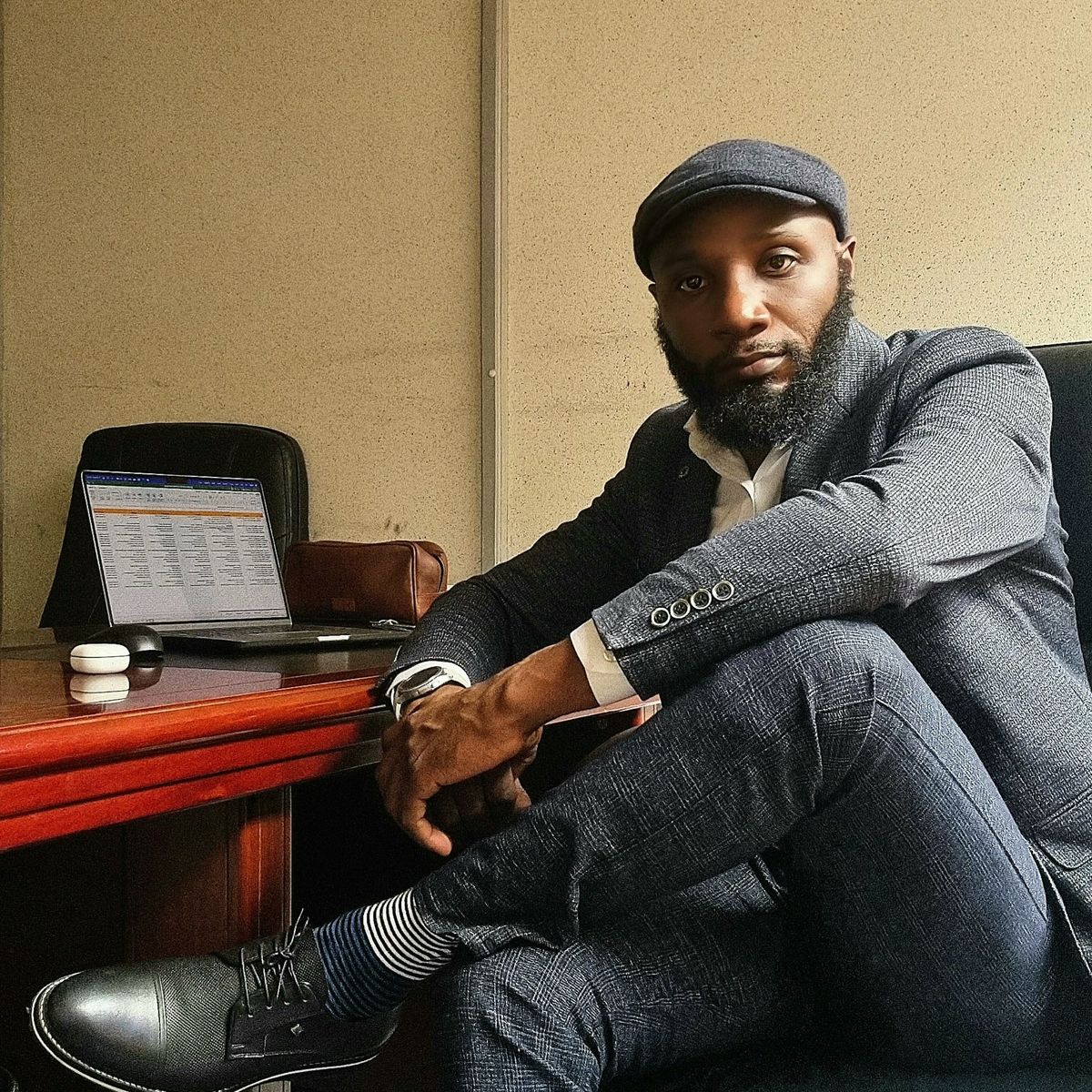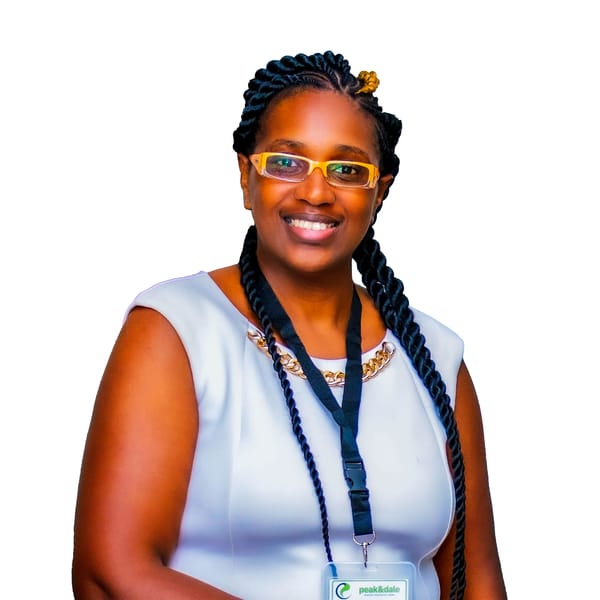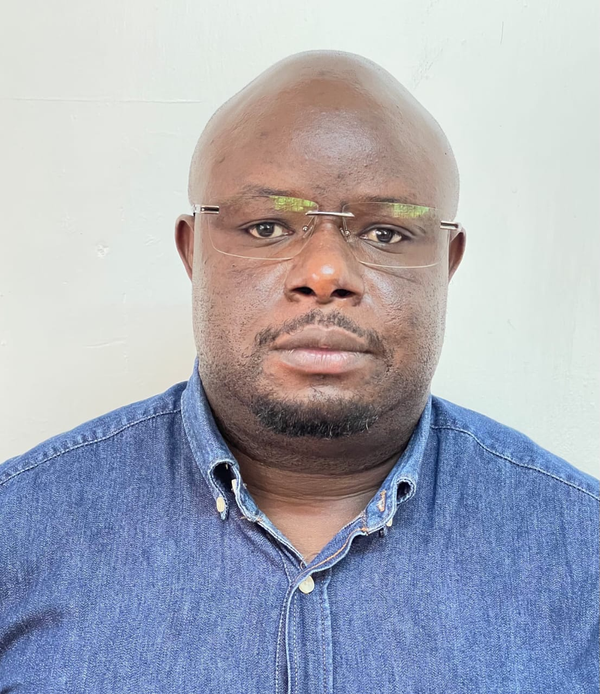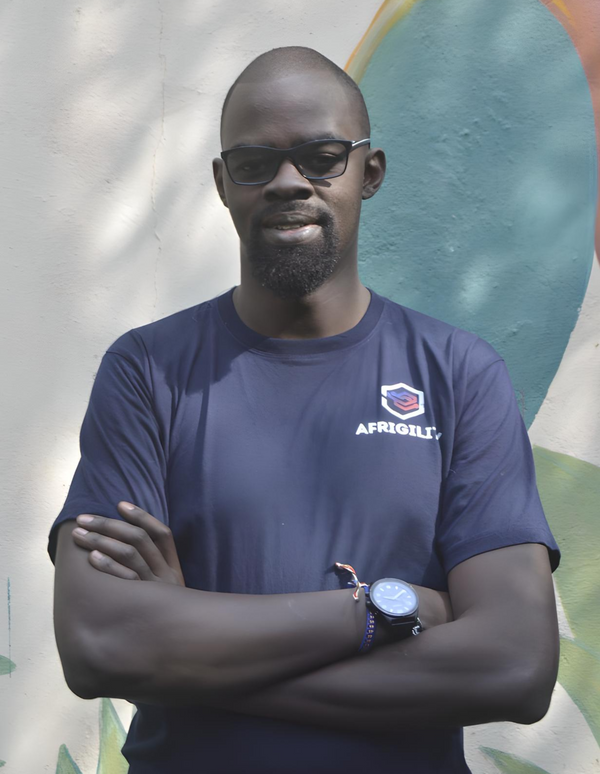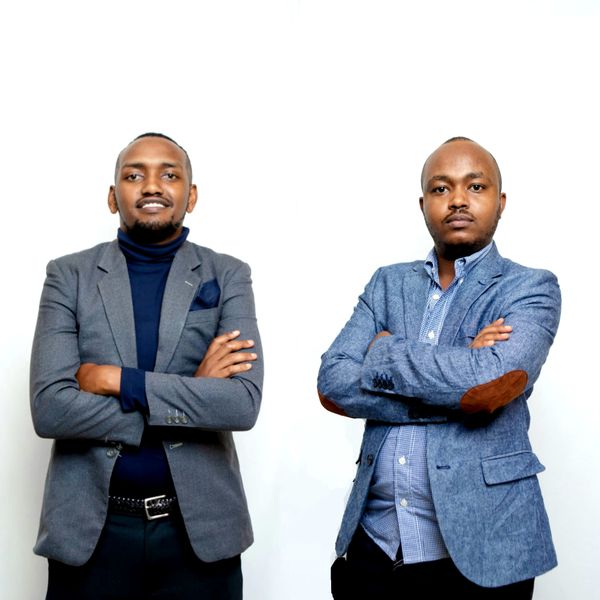Nairobi, Kenya
In a world driven by the relentless pursuit of profit, TheBhub stands out with its distinctive business model. At the core of their philosophy is a simple yet transformative idea: prioritize affordability for customers, fair compensation for employees, and still achieve financial sustainability. This unique perspective challenges conventional norms and has propelled TheBhub into a leading role in Kenya's technological sector.
TheBhub's team has harnessed this approach to empower Kenyan startups and innovators by providing accessible, cost-effective technology solutions. The company helps entrepreneurs shape their ideas, develop a clear vision, and turn them into reality, creating more innovation opportunities in the country.
The business embodies the same curiosity and fascination with technology that guided its founder, Granville Wafula, in his early years.
Following the light bulb
As a young boy in Kenya, Granville collected small light bulbs in the village, brought them home, and illuminated his room with an array of colors. In his early high school days, Granville found himself drawn to the world of electricity, the mysterious force that powered the technology of his era.
"For me, things just started opening up, and I found it very fascinating that technology can change how we think [and] how we communicate. In 2004, we didn't have mobile phones in Kenya that much. A calling card would cost maybe about 50 bucks if you were to purchase one, and a mobile phone — you wouldn't even imagine having one," Granville remembers, noting all he had access to were magazines showcasing different types of technology.
"Technology enables you to create a purpose and one that would impact not only you but others as well. I saw it as an anchor that my dreams could ride on," he says. "Entrepreneurship came later when I realized I needed to pay bills."
Chasing his passion for impacting people's lives through technology, he teamed up with Abdulwalli Shariff, an aspiring businessman and philanthropist, after finishing university. Together, they set out to empower Kenyan startups and small businesses to build technology without cost constraints.
But before they found a solution, the team faced the problem themselves.
Local talent
In 2017, the blockchain concept was still relatively new in Kenya, but Granville and his partner recognized its immense potential, particularly in sectors like coffee and tea trading. They embarked on a journey to develop applications that could trace the journey of these commodities from the farms to consumers' tables to instill trust and transparency throughout the supply chain.
Eager to bring this vision to life, they explored the possibility of assembling a team of blockchain developers from the United States and India. However, the costs involved were staggering, with some professionals quoting rates as high as $500 per hour. So, Granville and his partner decided to hire some local developers.
"We said, 'Let's form a community, develop them together, and give them the support, space, technical capacity to go sit and discuss ideas and innovate with our guidance," Granville explained. In a month, they had gathered 100 people. And just a month later, there were 200 developers on the team.
"After we built these solutions, we asked: What are we going to do with these developers? This is raw talent," Granville remembered. It was 2018, and this is when TheBhub was born.
TheBhub is a Nairobi-based agile software development and staffing company that aims to accelerate innovation in Africa by integrating emerging technologies into every application and platform it develops. They also support the growth of startups by providing web and mobile app development services with flexible credit options.
TheBhub emerged from the belief that ambitious projects can thrive on a lean budget, a sentiment shared by many startups and something Granville himself is passionate about. The misconception that building is costly arises from freelancers' unpredictability in Kenya due to a lack of organization and discipline. TheBhub strives to change this narrative by emphasizing efficient resource use and structured processes, proving that significant achievements are possible without breaking the bank.
"Our mission was to organize these software engineers in a manner that they could deliver value to these startups and have these startup founders and small organizations... not doubt or not look over their shoulder when they want a solution delivered for their customers," Granville explained. He and his team had to start with an effective recruitment process to achieve the mission.
Skills vs. personal traits
Regarding connecting with suitable candidates, TheBhub promotes its developer program on its website and leverages LinkedIn to identify potential team members. Once candidates apply, they undergo a thorough evaluation to determine their skill level as junior, mid-level, or senior developers. Successful candidates are then admitted to TheBhub's membership program.
Admission to their program varies based on the role and commitment level. General membership primarily considers professional achievements rather than character assessment. However, joining the core team for full-time support of startup projects is a distinct process. It involves rigorous evaluations, including in-person interviews with Granville, to assess qualifications and suitability. He tries to see the persona behind the skills – who they are, how they usually work, and how they deal with work-related issues.
"One specific question I always ask is about the challenges they've encountered while developing applications or working on projects in the past and how they tackled those challenges. It's an open-ended question but provides lots of information," Granville explained.
"I gain insights into what truly motivates and drives them. For some, it's a deep-rooted passion, and their dedication is often influenced by their environment."
This meticulous approach ensures that TheBhub places the right talent in critical roles within the core team.
From uncertainty to structure
Once the recruitment process was in place, the very first issue TheBhub faced was to organize up to 300 developers in a central location because freelancers often move from one company to another in a quest for the best opportunity. In some cases, they would abandon ongoing projects to join new ones, resulting in numerous startups failing. Ultimately, TheBhub was losing thousands of dollars.
Granville remembers this period as challenging for the company and himself. A client paid TheBhub a substantial amount, approximately 400,000 USD, equivalent to 40 million Kenyan shillings, for a project. They assembled a team comprising internal developers and contractors from their pool of over 200 developers to handle the project. It turned out that the carefully-chosen team failed to deliver, leading to a complete project overhaul. TheBhub lost around 100,000 USD or roughly a quarter of the original investment. That's when Granville and his team knew the company wasn't going in the right direction, and they needed to make a change.
"It's not easy to change peoples' mindsets. We decided that building a platform to power the talent would be a much better solution."
The platform they created caters to software engineers, enabling them to register and create profiles, much like today's online freelancing websites. Regardless of their job status — whether employed, freelancing, or aspiring — they can indicate their availability.
To avoid financial losses for the client and TheBhub, the team introduced the escrow system on the platform. The budget is in escrow until the project is approved by the TheBhub project manager and the client, creating more transparency for everyone involved. "It brings trust both for the developer and the entrepreneur, and that's how we solved the problem of discipline and organization." Developers feel safe because they know that their amount is with a third party, and as a company, we also know that we won't lose money. We've become wiser about it."
At TheBhub, the platform ensures that the developers work in an organized manner. But keeping them engaged and motivated is another issue. TheBhub's approach begins by identifying the challenges that developers may encounter. One of them is the need for an environment conducive to peer interaction. For that, TheBhub has partnered with co-working spaces, offering a gathering place for developers to work on their projects and socialize.
Motivation is also fostered through educational partners who contribute to the upskilling of developers. This academic support is complemented by internal collaboration within the organization. Senior developers play a pivotal role by mentoring junior developers, referred to as "Connects." Senior developers include these Connects in their circle, assigning them small tasks. The code or project is submitted for review upon completion, with scores provided as feedback. Granville said it instills motivation in junior developers, knowing they have a support system that genuinely cares about their growth and success.
Bridging the gap for Kenyan startups
TheBhub's platform also allows startups to connect and collaborate with high-level developers, helping these companies access specialized talent and accelerate their projects' progress.
"Say I work for Google as a software engineer, and I am from Kenya, and the startups are struggling back in Kenya. I can spare a few hours to quickly do this or jump on a project and drive it much faster, with better knowledge of how quickly to deliver."
One such collaboration resulted in a platform called Kazi, which was created with the help of developers from Safaricom — the largest telecommunications provider in Kenya. In the slums of Nairobi and other remote areas, many people have limited education and skills. They are unemployed, but they can still work. The Kazi app enables gig workers to register on the platform and offer services like plumbing, electrical work, and cleaning, fostering economic opportunities in marginalized communities. Once these workers are ready, Kazi connects them with urban residents who seek assistance with various tasks, including grocery shopping, pet care, dog walking, and laundry services, catering to the needs of those who prefer to delegate such responsibilities.
"That way, we were able to bring talent that was perhaps being shipped out of a country because that was the norm," Granville explained.
Many talented individuals in Kenya were often lured away to work on software projects abroad for years. And so, when entrepreneurs had brilliant ideas, they lacked the means to bring them to life. This, in turn, posed a significant challenge for the industry, as Granville mentioned. He compared control over emerging technologies, such as artificial intelligence, to handling a powerful weapon. It means that taking charge of technology and supporting local talent was important not only for the development of entrepreneurship in Kenya but also for protecting national security.
"I would rather develop solutions internally here, keep order internally, localize solutions, and avoid that risk in the future," he explained.
So, TheBhub's next challenge was to support as many local innovations as possible, which meant providing comprehensive support to Kenyan startups.
Unlocking opportunities
Granville firmly believes that when he commits to collaborating with a startup, he assumes a significant responsibility to ensure the company's success. His commitment usually goes beyond technical expertise. Like he did with the app for a local Arab cuisine restaurant in Nairobi, which will help the startup manage its entire ordering process — from online menus to receiving and fulfilling orders online. He has actively participated in client meetings to conduct product demonstrations and engage in fundraising efforts.
"We do not accept anyone and everyone to build with us because this is a startup we are building. It's a company that we're building with these guys. It's not simply software we are making and giving the customer to go with. So, it involves a lot of other handholding even up to the market."
TheBhub is eager to onboard a limited number of startups each year, typically ten at most, following a cohort-based structure for their selection process. Granville's role in all of these entails lots of talking and listening.
"Once they come on board, I know the loopholes. I know what a good idea is, what problem to solve, and what is not. Sometimes, I give them suggestions and tell them, no, let's change this. Let us do it this way. To an extent where they feel like I know better about the idea than they do, and that puts me on a journey with them.
"Entrepreneurs often come with great ideas, but they don't understand the dynamics of the market," Granville explained. "It catches them by surprise. They get to the point when they either run out of funds or just put the idea aside."
The first step in TheBhub's approach is to help entrepreneurs scope their ideas. They would engage in brainstorming sessions to gain a deep understanding of the problem the startup aims to solve, refining the concept along the way. They would also delve into cost estimation, recognizing that building technology required compensating top talent adequately. Still, there could be ways to make it more manageable.
TheBhub's solution is what Granville calls "Innovation on Credit." Startups could pay for their projects monthly over a specified period, with the duration linked to the project's total cost and with no interest charges. For instance, if a project costs $100,000, it could be spread over 10 months.
The approach resonated well with startups and even corporate clients, as it eased the burden of managing cash flows. It allowed TheBhub to support up to 20 startups over the past three years, effectively bringing their ideas to life.
"We don't just design and develop; we work for the entire journey with these founders and solutions we believe in."
Upon receiving applications, TheBhub meets entrepreneurs at its headquarters to gain a deeper understanding of their project ideas, collaborating closely to refine concepts, acknowledging that some may have great ideas but need help considering market dynamics and innovation reception.
Admission into TheBhub's "Innovation on Credit" program hinges on specific criteria, including the entrepreneur's financial commitment to the project. Those willing to invest their own funds or have a source of income set aside for development are more likely to be admitted, as this financial responsibility is crucial when building on credit.
The payment structure is tailored to the size and cost of each project, ensuring flexibility and affordability for entrepreneurs. The larger the project and associated expenses, the more accommodating the payment installments become. In contrast, smaller projects come with more manageable payment plans. To maintain clarity and predictability, TheBhub sets a maximum cap of two years for larger projects.
Since its launch, many startups, including the Kazi app, have benefited from the "Innovation on Credit" program.
The vision beyond
TheBhub's focus on startups led to the realization that many entrepreneurs needed guidance beyond just building their applications. They needed insights into fundraising, hiring, navigating government regulations, and other business challenges — not just in Kenya but everywhere else. To address this need, they decided to increase SME engagement.
Within this initiative, TheBhub takes a careful approach to vetting entrepreneurs who want to participate. They conduct a "discovery session," where potential entrepreneurs visit their office for a face-to-face meeting, engaging in discussions. During these conversations, they delve into the entrepreneur's business idea, scalability, funding requirements, and other crucial aspects. It allows the company to better understand the entrepreneur's vision and determine if their support aligns with their needs and goals.
After a pause caused by the COVID-19 pandemic, TheBhub plans to relaunch the initiative from the upcoming January.
TheBhub is also creating an internal fund called the "Next Fund" to better support startups, set to launch next year. This fund aims to attract local investors in Kenya for high-risk, high-reward ventures. Instead of upfront capital, investors will commit to monthly deposits, which will be used for activities like customer acquisition and growth, helping startups grow faster and become more attractive to other funding sources.
TheBhub's journey is characterized by empowerment, innovation, and a profound commitment to making a meaningful difference in technology and business. It turns out its mission extends far beyond the borders of Kenya.
"Here in Kenya, we were able to build startups no one thought would see the light," Granville said. "Now we are looking to spread across Africa."
Granville believes that startups across the continent mostly face the same issues, so TheBhub's model of working with startups and managing talent could be replicated elsewhere. The fundamental strategy is to utilize local talent who understand the region's problems.
Now, TheBhub is exploring various markets for potential expansion, focusing on countries like Nigeria and Rwanda. These countries hold significant promise for startup development, with Rwanda standing out due to its favorable startup regulations and a robust startup bill in place, while Nigeria offers attractive opportunities for budding entrepreneurs.
There is one more market that Granville has been eyeing for years outside Africa: "The U.S. has been on my mind, not just with one project, but as an organization — setting up there. It would be great to see what value we can add to the famous Silicon Valley."

